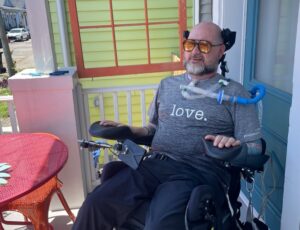Some of the most notable tech leaders of our generation are publishing cautionary tales on the future of AI. The thoughts below are inspired by an ongoing project with iRobot, Team Gleason and The Jeansonne 7 to better understand the ALS community for whom, AI and spatial computing present exceptional life-changing opportunities.
These insights offer an alternate perspective on AI-related technologies, not as intelligent robots capable of destroying humanity, but as intelligent life enhancements capable of creating a better, more inclusive world for all.
1. Sizing the Market Potential
Approximately 35% of Americans live with a diagnosed disability. It’s a valuable but undervalued market sector. Globally 1.3 Billion people live with significant disability. By comparison, the population of China, the largest country on earth, is a touch over 1.4 Billion.
2. Market Value
People living with severe or terminal physical disabilities are super-testers. For just one moment, let’s ignore the support these communities so desperately deserve. From a purely capitalist business perspective, testing new product development ideas with some of the most physically disabled communities allows significant commercial business advantage. Because when you design for them, you also design for people living with attention deficit, independent living for an aging population, loneliness, depression, mental health support, and significant medical life adjustment ( obesity, heart disease, cancer communities to name a few). None of these health-related groups are getting smaller. In the most ruthless capitalist world, people living with disability are incredible teachers, able to guide us toward better product design, development, UX, EX, and incremental revenue growth and efficiency improvement. As we start to think more deeply about the commercial application of disabilities-led design, the argument for commercially driven investment strengthens. And in a capitalist market, profit-motivated investment planning with always outlast ESG and DEI discretionary spending.
3. Disruptive Potential
Despite the advances made with eye tracking technology, the majority of non-verbal people living with ALS can eye-type at about 6-8 words per minute. Large language processing offers explosive potential for non-verbal and limited communication. And the life-changing potential of mixed reality technology and spatial computing is enormous for the 1.3 Billion people living with significant disability in the world today.
4. The Barriers Are Not Technology
If we can pilot remote drones on other continents and if we can drive home asleep in our Teslas, why is it still so difficult to navigate the average restaurant or board a commercial flight in an assisted chair? The barriers are not technology. The barriers in America are bureaucracy, liability, and lack of commercial investment.
5. There Are No Smart Homes (yet)
Our homes are far from smart. Our homes are full of smart devices, which do not communicate with each other and require individual Apps for setup. Imagine, turning the lights off, unlocking the car, lowering the thermostat, and setting the house alarm from an assisted chair. AI and Net Gen spacial computing offer exceptional life improvement for the significant population living with disabilities in the home. And their design leadership will lead the development of the first generation of truly smart homes.
6. The Real Threat Is Us
As a nation, we’ve taken enormous steps forward toward the destruction of our society and planet under our own steam. We’ve put people in places of power to create their own false rhetorics and roll back decades of progress to protect special interests. What threat does AI pose to us that we don’t already pose to ourselves?
As business leaders, we need to focus our commercial energy and expertise on building more diverse and inclusive practices like our future depends on it, commercially mindful that we are designing for a community close to the size of China. And fundamentally what is good for our society and planet, also has to be good for business. That’s when we truly start to win.


